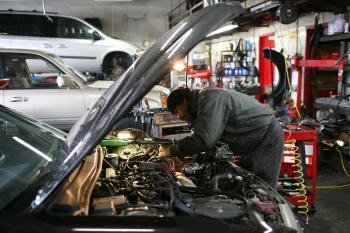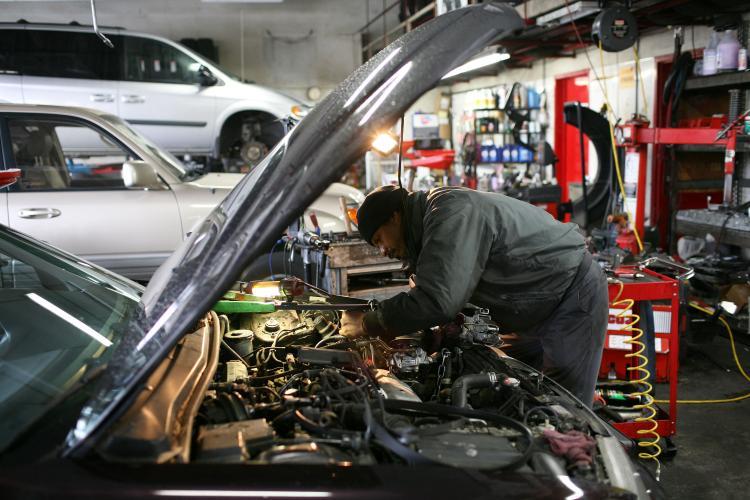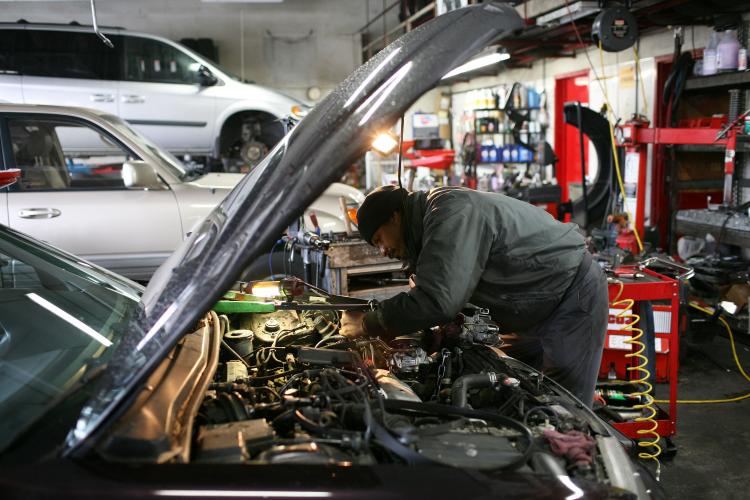Much to the delight of many consumer groups and independent automobile repair shops, the so-called “Right to Repair” bill passed second reading in Parliament last week.
Bill C-273, a Private Member’s Bill sponsored by New Democrat MP Brian Masse, aims to ensure non-dealer repair shops have access to technical information and tools required to service vehicles that have so far been exclusively accessible to dealerships.
The issue has come under the spotlight in recent years with the increased use of computerized technology and embedded systems in vehicles, making it difficult or sometimes impossible for independent repair shops to service newer vehicles.
The bill has also been supported by some environmental organizations claiming consumers need to have adequate access to vehicle maintenance service to keep their vehicles in a good state and minimize pollution.
“Today, the House of Commons chose to side with every vehicle owner in the country, with protecting the environment, with the public’s safety instead of a group of foreign companies,” Masse stated after the bill passed second reading.
Preferring an industry-led voluntary-based approach, Industry Minister Tony Clement asked auto makers last month to provide means and mechanisms so independent repair shops can have access to the required tools and information.
“Maintaining the status quo is not an option,” Clement said.
In a letter of intent released early this month, major auto manufacturer associations and one auto trades association, NATA, committed to coming up with a voluntary approach similar to the one currently in place in the U.S.
However, the voluntary approach has been denounced by some organizations including the Automotive Industries Association (AIA) of Canada, a national trade association representing the automotive aftermarket, which says the legislated solution is “the only real mechanism” to resolve the issue.
MP Masse also argues that the voluntary approach would not be effective since “no environmental or consumer protection rule is voluntary.”
“A law is the only real protection for vehicle owners that is available,” he said.
Other sectors opposed to the legislation include the dealerships, who believe it would be a blow to the already ailing auto industry.
“The legislation as it exists is not acceptable, because it’s very heavy-handed,” says Michael Hatch, chief economist for the Canadian Automobile Dealers Association (CADA).
Hatch argues that the government should allow the stakeholders to come up with a solution whereby automakers make their intellectual property associated with diagnostic and repair systems available to the market at a price set by supply and demand, while ensuring their IP rights are protected.
“This is intellectual property and repair and diagnostic information that costs billions of dollars to develop, and basically [the bill] would force the hand of manufacturers to disseminate that information,” he says.
Hatch notes that the vast majority of the required information is already available on the market through subscription services, but there are restrictions on the release of information for the very newest of vehicles. However, he says, any issues with the newest cars are handled under warranty, and dealers get the warranty jobs regardless.
He says Masse is framing the issue as a case of “consumer outcry” over the lack of enough competition in the market place, while that is not the case.
“People are not complaining that they aren’t able to get their cars fixed and non-affiliated shops already dominate the out-of-warranty sector.”
If the non-dealer shops are already the dominant players in the non-warranty work and all the issues with the newest cars with the restricted information are handled under warranty, thus ensuring ownership remains with the dealerships, why the controversy over the bill?
“Because we think that there are other motivations for this bill and that it could be, if passed, a means by which they could then push the issue further and then go after warranty work,” says Hatch.
Dale Finch, executive vice president of National Automotive Trades Association (NATA), an association representing mostly provincial as well as municipal and national trade associations, calls this concern “non-founded.”
“We’re not interested in going after the warranty business,” he says, adding that “we need to have a healthy dealer body in Canada as well.”
“This has really become a prominent issue over the last five to seven years because computer technology is really accelerating, and many vehicles, for many different reasons, they are using more and more computerablity in the vehicle.”
Finch cites the microchips used in power mirrors as an example. The microchip, he explains, talks to the main computer of the vehicle, and in order to have it operate after it is installed, the chip needs to be flashed with a patch.
“A lot of times we’re able to repair the vehicle at the body shop, and then we have to tow the vehicle to the dealership to update the software flashes to get the components to actually operate,” he says.
“Our issue is … that we need access to the scan tools, and the actual software flashes, that you put on the microchip of many, many components in the vehicle.”
Finch says General Motors has been sharing tools and information openly, while other manufacturers have not been very cooperative in this regard. Nonetheless, he is confident that the letter of intent on the voluntary agreement signed by automakers will ensure the non-affiliated service shops can receive all the information and tools required.
NATA endorses the voluntary initiative because the legislative approach could take years before it comes into effect.
“The manufacturers want to protect their intellectual property and in order to do that they will go to the courts to protect it…and we don’t want to end up [in a situation] where the manufacturers go the courts for the next 10 years.”
Bill C-273 has been referred to a parliamentary committee for further study and possible amendments.
Bill C-273, a Private Member’s Bill sponsored by New Democrat MP Brian Masse, aims to ensure non-dealer repair shops have access to technical information and tools required to service vehicles that have so far been exclusively accessible to dealerships.
The issue has come under the spotlight in recent years with the increased use of computerized technology and embedded systems in vehicles, making it difficult or sometimes impossible for independent repair shops to service newer vehicles.
The bill has also been supported by some environmental organizations claiming consumers need to have adequate access to vehicle maintenance service to keep their vehicles in a good state and minimize pollution.
“Today, the House of Commons chose to side with every vehicle owner in the country, with protecting the environment, with the public’s safety instead of a group of foreign companies,” Masse stated after the bill passed second reading.
Preferring an industry-led voluntary-based approach, Industry Minister Tony Clement asked auto makers last month to provide means and mechanisms so independent repair shops can have access to the required tools and information.
“Maintaining the status quo is not an option,” Clement said.
In a letter of intent released early this month, major auto manufacturer associations and one auto trades association, NATA, committed to coming up with a voluntary approach similar to the one currently in place in the U.S.
However, the voluntary approach has been denounced by some organizations including the Automotive Industries Association (AIA) of Canada, a national trade association representing the automotive aftermarket, which says the legislated solution is “the only real mechanism” to resolve the issue.
MP Masse also argues that the voluntary approach would not be effective since “no environmental or consumer protection rule is voluntary.”
“A law is the only real protection for vehicle owners that is available,” he said.
Other sectors opposed to the legislation include the dealerships, who believe it would be a blow to the already ailing auto industry.
“The legislation as it exists is not acceptable, because it’s very heavy-handed,” says Michael Hatch, chief economist for the Canadian Automobile Dealers Association (CADA).
Hatch argues that the government should allow the stakeholders to come up with a solution whereby automakers make their intellectual property associated with diagnostic and repair systems available to the market at a price set by supply and demand, while ensuring their IP rights are protected.
“This is intellectual property and repair and diagnostic information that costs billions of dollars to develop, and basically [the bill] would force the hand of manufacturers to disseminate that information,” he says.
Hatch notes that the vast majority of the required information is already available on the market through subscription services, but there are restrictions on the release of information for the very newest of vehicles. However, he says, any issues with the newest cars are handled under warranty, and dealers get the warranty jobs regardless.
He says Masse is framing the issue as a case of “consumer outcry” over the lack of enough competition in the market place, while that is not the case.
“People are not complaining that they aren’t able to get their cars fixed and non-affiliated shops already dominate the out-of-warranty sector.”
If the non-dealer shops are already the dominant players in the non-warranty work and all the issues with the newest cars with the restricted information are handled under warranty, thus ensuring ownership remains with the dealerships, why the controversy over the bill?
“Because we think that there are other motivations for this bill and that it could be, if passed, a means by which they could then push the issue further and then go after warranty work,” says Hatch.
Dale Finch, executive vice president of National Automotive Trades Association (NATA), an association representing mostly provincial as well as municipal and national trade associations, calls this concern “non-founded.”
“We’re not interested in going after the warranty business,” he says, adding that “we need to have a healthy dealer body in Canada as well.”
“This has really become a prominent issue over the last five to seven years because computer technology is really accelerating, and many vehicles, for many different reasons, they are using more and more computerablity in the vehicle.”
Finch cites the microchips used in power mirrors as an example. The microchip, he explains, talks to the main computer of the vehicle, and in order to have it operate after it is installed, the chip needs to be flashed with a patch.
“A lot of times we’re able to repair the vehicle at the body shop, and then we have to tow the vehicle to the dealership to update the software flashes to get the components to actually operate,” he says.
“Our issue is … that we need access to the scan tools, and the actual software flashes, that you put on the microchip of many, many components in the vehicle.”
Finch says General Motors has been sharing tools and information openly, while other manufacturers have not been very cooperative in this regard. Nonetheless, he is confident that the letter of intent on the voluntary agreement signed by automakers will ensure the non-affiliated service shops can receive all the information and tools required.
NATA endorses the voluntary initiative because the legislative approach could take years before it comes into effect.
“The manufacturers want to protect their intellectual property and in order to do that they will go to the courts to protect it…and we don’t want to end up [in a situation] where the manufacturers go the courts for the next 10 years.”
Bill C-273 has been referred to a parliamentary committee for further study and possible amendments.








Friends Read Free